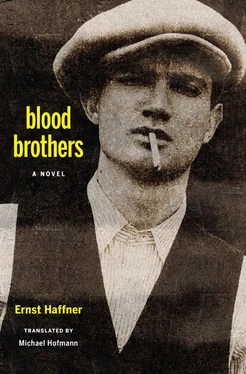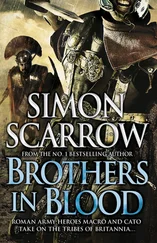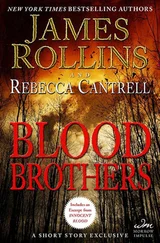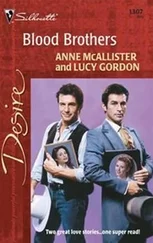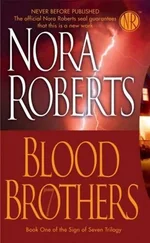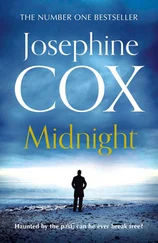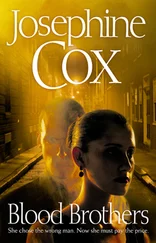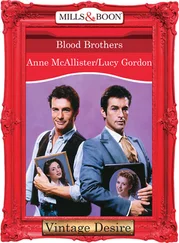COMPREHENSIVELY POWDEREDwith the fine dust of country roads, hungry and thirsty and falling-over tired, a young lad slinks along Linienstrasse at midnight, turns down Rücker, and slopes into the Klause.
It’s Fred, who seven months ago was picked up in Magdeburg, along with Jonny and Frenchy Felix. The juvenile court in Magdeburg sentenced Fred — who had no prior convictions — to eight months in prison. Then he was taken to the Berlin authorities. For a car theft. He was suspected of being involved in many other crimes. But, in Berlin, Fred had a great stroke of luck. The people in Leipzig who had watched Fred weren’t able to maintain with hundred percent certainty that this was the man who delivered that car to the garage. Since Fred denied everything, had seen Jonny but didn’t know him, and had never been a member of any gang, the court had to acquit him for lack of evidence. Thereupon the court in Magdeburg gave him half his sentence off on probation. Fred did four months and was then shipped on to a juvenile detention center outside Berlin.
From his first day there, Fred thought of nothing but getting out. It took him two months before he could. And now, back in Berlin, he is looking for his gang, for the Brothers. There’s no one in the Rückerklause. The place is almost empty. The regulars are dotted about the woods and lakeshores around Berlin. Only when their tummies rumble do they visit the city and spend a day or two scrounging food. No Blood Brothers at Schmidt’s on Linienstrasse either. Finally, in Max’s next door, there’s Konrad on his tod with an orangeade. “Hey, Konrad …” “Fred …! Fred! Where’ve you sprung from?” Fred picks up Konrad’s glass and empties it. “Where from? What do you think, I made a break for it!” “From jug?” “No, welfare. Have you got funds, Konrad? I’m starving …”
Konrad has a two-mark piece, and half of that is for Fred. They walk round to Aschinger’s on Rosenthaler Platz. Fred wolfs down a bowl of pea soup and cleans out the bread basket. A small beer, a couple of cigarettes, and the money’s all gone. But Fred is himself again. Fred, who had steered the fortunes of the gang, back in the day when everyone had a fistful of bills in his pocket. “Where’re the others then?” he asks. Konrad can only shrug. Heinz surrendered to the police. Walter and Hans were picked up three months ago. Georg is pimping for a bird. Has a snazzy wardrobe and boozes away the cash she brings home in the bars around Bülowbogen. And Erwin, he’s on the game hereabouts, on Rosenthaler Platz. One mark a pop … down in the gents. They collared Ulli, too, in his summer house on Christmas Eve. And as for himself, Konrad, he’s not exactly on top of his game. A mark here, a thaler there. No news of Ludwig or that other guy, Willi.
Fred has a think. “That means there’s just you and Erwin and me … okay, let’s get a couple of recruits. Jonny’s going to be a while. They gave him eighteen months down in Magdeburg.” Konrad is full of enthusiasm for Fred. Erwin, too, whom they run down in the Schnurrbart-Diele on Gormannstrasse, is ready to throw in his lot with Fred right away. It’s a warm night; they spend it in Friedrichshain park.
The next day, Fred and Konrad and Erwin get to work. Fred seems to have forgotten nothing in the seven months he was gone. A couple of hours later and he has three purses. Forty-two marks. And by that evening there’s six gang members. They’re sitting at Raband’s on Elsässer Strasse. Fred has been appointed gang leader. The Blood Brothers are back in business. And along with them, hundreds of other gangs and bands up and down the length of the Berlin road. *
And Willi and Ludwig? They’re back with their tailor near Görlitzer Bahnhof. Buying and selling old boots and shoes, and making a reasonable living. Their gangland time is in the past, forgotten. But they still suffer from having to live unregistered. Any minute could be their last together. For another year Ludwig has to have the sword of Damocles over his head, from having absconded from his borstal. Calamity could strike at any moment, the police might come for him and take him away.
These two, who have gone through every sort of hell and limbo to escape from welfare. The sort of upbringing that claims to guard against moral turpitude. The soprano with milk teeth next to the gangland routinier. The fifteen-year-old virgin — she shoplifted the odd ribbon, some glass beads or chocolates in a department store — next to the young prostitute who already has her first dose and Salvarsan cure behind her …
The poisons that are bred from the indiscriminate mingling soon make themselves evident. The boy has learned from his pals that as a fair-haired pale-skinned underage youth, he doesn’t have to learn the ins and outs of stealing or breaking and entering if he runs away. On Fried-richstrassenpassage or in Tiergarten a boy like that can earn — quite literally — a pretty penny. Even in the institution a boy like that may receive the odd amenity. At night, in the dorm. The big twenty-year-old lunks lie in their beds, unable to sleep with their imaginations heated by fantasies of the other sex.
Willi and Ludwig stick together like burrs — they need each other. Without Willi, Ludwig would be on the brink. And Willi knows that he needs his chum.
Berlin — endless, merciless Berlin — is too much for anyone on their own. They felt it over numberless nights what it means: to trudge alone through sleeping streets. Trudging … trudging. Mechanically setting one foot before the other … one … foot … be … fore … the … other … Till the exhausted machinery fails and you find yourself slumped in a doorway somewhere. Not for long. Because a police patrol comes past. Taps you on the shoulder: “Oi, you! Haven’t you got a home to go to? You can’t sleep here.” “Er … what? Home? Course … course … I just dropped off. I’m on my way, officer, I’m on my way …”
If there’s two of you, it feels different. A night is only half as long and half as cold; even hunger is only half as bad. One gives the other a nudge in the ribs: “Well, what about it? Let’s go! Two trips from Schlesischer Bahnhof to Charlottenburg, and the night’s over.”
Willi and Ludwig can afford to laugh. But the glum sense that, even now, some Hermann Plettner or other could steer the police their way, that never quite lets them go. The time till Ludwig’s twenty-first birthday will cost them a few anxious moments yet. Willi and Ludwig, two out of the wretched army of big-city layabouts, who even as they were about to be washed away, weren’t washed away. Two of thousands on the Berlin high road.
*“Landstrasse Berlin”: this, Haffner’s original title, conflates Berlin and the “high road” of tramps and allegory.
ERNST HAFFNERwas a journalist and social worker. His only known novel, Blood Brothers, was published to wide acclaim in 1932 before it was banned by the Nazis one year later. In the 1940s, all records of Haffner disappeared. His fate during World War II remains unknown.
MICHAEL HOFMANNhas translated the work of Franz Kafka, Joseph Roth, Hans Fallada and many others. In 2012 he was awarded the Thornton Wilder Prize for Translation by the American Academy of Arts and Letters. He is the author of several books of poems and essays, including Where Have You Been? (2014). He lives in Florida and London.
HERBERT A. ARNOLDwas born in the then Czechoslovak Republic in 1935 and educated in Germany. He is professor emeritus of German and Letters at Wesleyan University in Middletown, Connecticut.
